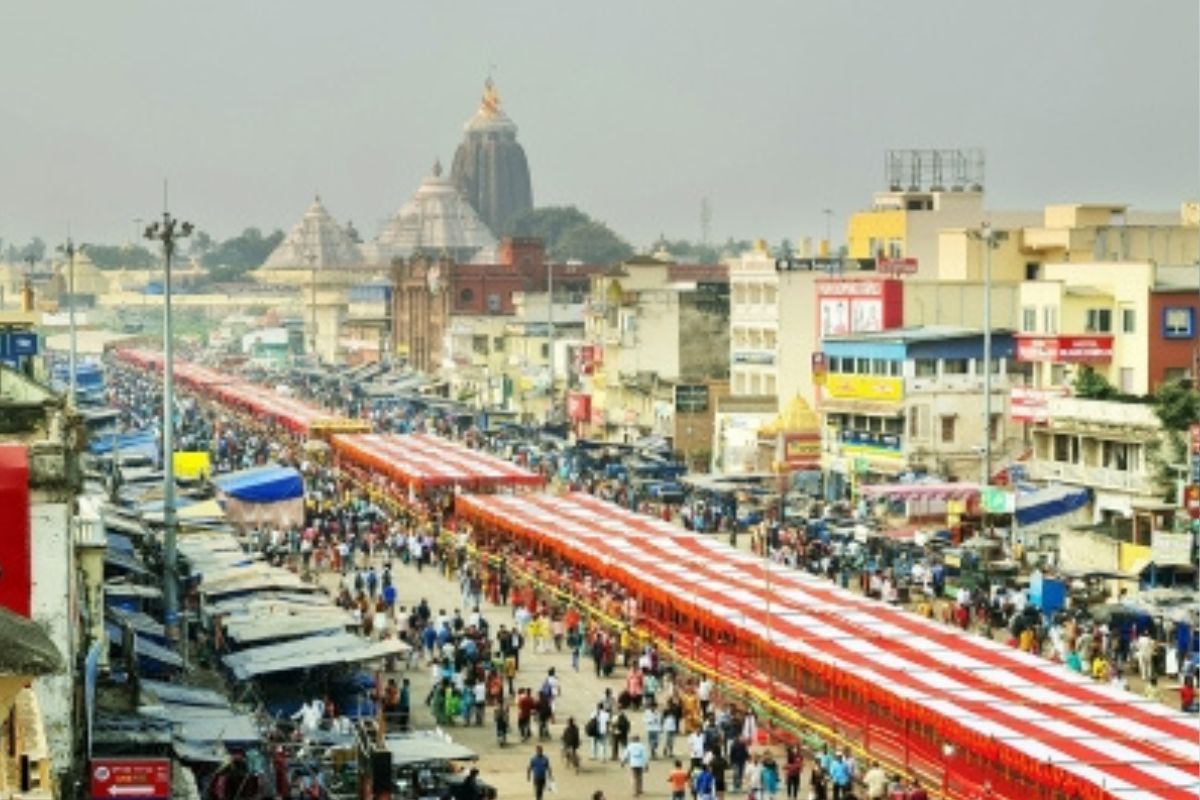The Indian Railway plays a vital role during the Car Festival at Puri by running special trains from different parts of the country. It provides additional passenger amenities, extra ticket booking, and reservation counters, passenger rest sheds, and a tourist complex for the rest of the devotees at the station and its circulating area.
As many as 40 railway workers use jacks to make a wooden chariot. They put a wheel in it and use a jack to stop the chariot. This is how the chariots of Lord Jagannath, Balabhadra, and Subhadra are prepared.
During the ceremonial procession, the three deities, Jagannath, Balabhadra, and Subhadra are hauled in huge decorated chariots from Puri’s Jagannath temple to Gundicha temple and back.
Every year, a team of East Coast Railway provides a very essential service in facilitating the smooth running of the three Chariots on Badadanda.
Aditya Sethi, Executive Operations Manager of the Indian Railways, said a team of about 40 workers accompanied the procession with equipment to pull the three chariots in line and remove any obstacle from their path. They are also responsible for inspection, alignment, positioning, and maintaining proper gaps between the chariots.
“The wood chariots don’t have modern features like differential steering (method to orient/steer a vehicle on wheels or tracks). We use traversing screw jacks that are controlled by about 40 people to pull the chariots in line.”
Ravindranath Panigrahi, a senior section engineer in the East Coast Railways, said he has been performing this job since 1987 and has been quite devoted to it.
He said that over the 11 days of the procession, the 40-member team remains on a strictly vegetarian diet and “prepares for a month in advance to get the screw jacks ready and devise strategies to make the chariots go straight”.
“Every year, this work has to happen. God never leaves us. It is a difficult task but nothing seems hard when one is doing God’s work,” he added.
Legend has it that in the early 1960s, one of the chariots got entangled with an electric pole resulting in damage to its axle. Senior officials became clueless about what was to be done. Incidentally, a railway officer was present there to witness the car festival. After contemplating the problem for a while, he found an analogy with that of restoration during coach derailment. He suggested doing it by using screw jacks and offered help voluntarily from the Railways. It is since then that East Coast Railways has been rendering the service every year.
An experienced team of 40 workers from the Railways actively participate in placing the chariots side by side by lifting and shifting them to their position using traversing jacks. All the jacks are placed at different places under the axle and operated simultaneously for lifting and shifting of the chariots. About 30 Nos. of traversing screw jacks (12 Nos. of “Nandi Ghosh ”, 10 Nos. for “Tala Dhwaja” & 08 Nos. for “Deba-Dalana”) are used for the purpose.
On the day of the Car Festival, the team escorts the chariots during their journey from Shree Mandir to Shree Gundicha Temple covering 3 km to attend any breakdown. On the fifth day of the ceremony (Hera Panchami), all the three chariots are reversed and placed at Nak-chana Dwar (exit gate of Shree Gundicha Temple) for preparation for the return journey. On the day of Bahuda, the team escorts the chariots during its journey from Shree Gundicha Temple to Shree Mandir.
On arrival at the Lions Gate, the three chariots are placed side by side in the proper position for “Suna Besa”. Each chariot is shifted from 6 ft to 8 ft to position them properly. This is entirely done by this team from the Railway led by a Senior Section Engineer of the mechanical department of the Puri Coaching Depot.
This service is planned in a very meticulous manner. The wish of Lord Jagannath to step out from his holy abode to see his devotees is nothing but his magnanimity. In this ocean of love and devotion that fills up in the souls of men and women the contribution of Railway is a small cog in the wheel.












